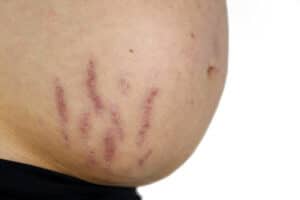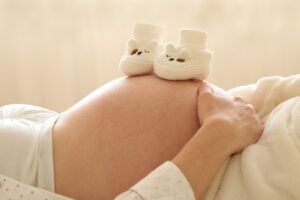You have just had the positive pregnancy test in your hand and a few days later you notice spotting? What sounds alarming is quite normal for many women. There are many reasons why light bleeding can occur, especially in early pregnancy. However, there is usually no cause for concern behind it.
Here you can find out why spotting is completely normal during pregnancy and why you don’t need to worry in most cases. You will also get an overview of the other pregnancy signs that can occur together with spotting in early pregnancy.
Usually they do not last long and are not accompanied by pain. If you are still worried, you can go home with the all-clear after an examination by your gynecologist. Here you can learn everything about spotting during pregnancy and its most common causes.
Table of contents
Signs Of Pregnancy Spotting? Completely Normal
You have just recently been happy about the positive pregnancy test and now you realize that you have spots? Probably the horror scenarios are rolling over in your head right now. In fact, spotting is one of the first signs of pregnancy for many women – even if it is not often talked about.
Many factors can cause you to experience light spotting again and again during early pregnancy. After all, your body is going through major changes and preparing to accommodate a baby in the next few months.
What Is Implantation Bleeding?
An even clearer sign of pregnancy than simply not getting your period or testing positive for pregnancy is implantation bleeding. The process behind implantation bleeding is the implantation of the fertilized egg into the uterus.
This implantation takes place about a week after fertilization and ensures that the maternal circulation connects with the embryo. During this process, the fertilized egg finds its place in the uterus and fuses with the uterine lining. In the process, blood vessels are injured and newly formed.
Against this background, it is quite understandable that the released blood can also be observed as spotting in the panties. Such bleeding in early pregnancy is relatively common and in itself is not a reason to be concerned about the healthy course of the pregnancy.
Thus, implantation bleeding can occur only after a fertilized egg has found its way into the uterus and implanted itself into the mucosa. The earliest time for this process is already one week after fertilization, so to speak in the third week of pregnancy.
At this very early stage, you probably do not associate spotting with a possible pregnancy. The implantation bleeding must have occurred no later than two to three weeks after fertilization. If you have not noticed any spot by then, it is unlikely that it is from implantation.
In any case, implantation bleeding signals the end of the implantation process. You cannot draw any conclusion about the further course of pregnancy from the presence of implantation bleeding. In fact, implantation bleeding can also be observed in ectopic pregnancies.
What Other Reasons Are There For Spotting During Pregnancy?
Even though spotting is normal in pregnancy, not all women experience visible implantation bleeding. Only a quarter of expectant mothers can report such spotting. If the amount is particularly small, this sign of pregnancy is likely to go unnoticed. It is also possible that the body can absorb small amounts before they show up as spotting in the underwear.
Another harmless type of spotting is light contact bleeding, which may occur after sexual intercourse. This is common in early pregnancy, as blood flow to the vagina, cervix, and uterus increases. Do you suspect you are pregnant but have not yet taken a pregnancy test? Then your normal period may be responsible for the spotting.
This is especially possible if your cycle is relatively irregular. Then, in principle, there is even the possibility that the spotting you observe is an ovulation bleeding and signals your ovulation.
What Are The Symptoms Of Spotting During Pregnancy?
Because the onset of your period is different for every woman and the symptoms overlap with implantation bleeding, it is relatively difficult to diagnose both without a doubt. However, some clues apply to distinguish light spot from a light period.
Spotting during pregnancy, but also independently of it, is accompanied by mild to moderate abdominal pulling. This is to be expected in early pregnancy as the uterus begins to expand. Stretching of the uterine ligaments may also be experienced as uncomfortable.
Usually, spotting in pregnancy presents the same way as usual: the blood is light-colored and mixed with mucus, but it can also have a brownish hue. If acute bleeding is imminent, the blood is likely to be bright red. Brownish blood indicates that the bleeding is already over and the collected blood is only now draining from the uterus.
How Long Does Spotting Last?
Spotting during pregnancy only lasts a maximum of two to three days. In principle, it can even occur before the positive pregnancy test. It is not uncommon to experience light bleeding only once, which is then over after a few hours.
However, it can also be normal to have another light bleeding a few days after it ends. It can occur around the expected date of the period, but also earlier or later. Spotting is usually particularly heavy after implantation in multiple pregnancies.
If there are two eggs implanting in the uterine lining at the same time, there will eventually be twice as many vessels injured. In twin pregnancies, therefore, implantation bleeding is particularly heavy and also lasts longer.
What To Do In Case Of Spotting During Pregnancy?
Of course, spotting during pregnancy will make you feel insecure at first. If your worries are great, you should therefore go to the gynecologist just to calm yourself down. In fact, implantation bleeding is not a disease and cannot harm the embryo or your health.
If it really is implantation bleeding, there are no measures or medications that your gynecologist can prescribe for it. However, if the symptoms are bothering you, there is nothing wrong with giving yourself an extra dose of rest and avoiding stress.
What Other Signs Of Pregnancy Should You Look Out For?
A confirmed nidation bleeding is one of the very sure signs that you are pregnant. If you are unsure or have not yet had a pregnancy test, you should also look out for the following possible signs of pregnancy.
Do you feel a pulling sensation in your abdomen, similar to the beginning of your period? If your normal period still does not start, you could be pregnant. After implantation of the fertilized egg, the uterus begins to grow and the blood supply increases.
In addition, the uterine ligaments begin to stretch, which can also lead to period-like pain. For this reason, many doctors consider this slight pulling pain in the abdomen to be a classic and very sure sign of pregnancy.
If you became pregnant using the temperature method, you may have noticed that something was different before the positive pregnancy test. A permanently elevated basal body temperature that continues to rise towards the end of the cycle is a very sure sign of pregnancy.
Other pregnancy signs that can occur in the first weeks of your pregnancy are often feelings of tension in the breast or nausea. Many expectant mothers also notice strong fatigue in themselves, which forces them to take breaks in everyday life.
But diarrhea and frequent urination are also among the symptoms of early pregnancy. As the uterus now expands, all surrounding organs, such as the intestines and bladder, feel the effect.
When Should Spotting In Pregnancy Be Clarified?
If you notice an increased need for rest in connection with spotting during pregnancy very soon after the positive pregnancy test, you should comply with this if possible. After all, your body is currently in a major “rebuilding phase” that requires all its strength.
Small breaks in your daily routine will help you to cope better with the changes. If you feel particularly tired, your gynecologist may even write you off sick.
Even if the spot is not really a cause for concern, you should always go to your gynecologist if you feel that your spotting is particularly heavy. The occurrence of increasing pain is also a sign that you should see your gynecologist be on the safe side.
In any case, bleeding in early pregnancy that causes you severe pain and produces large amounts of bright red blood should be clarified. Here you should clarify whether it is a normal spotting or the first stage of a miscarriage.












